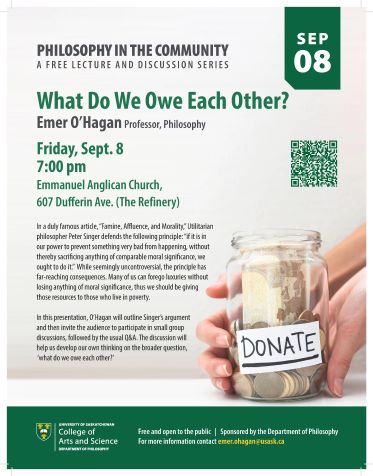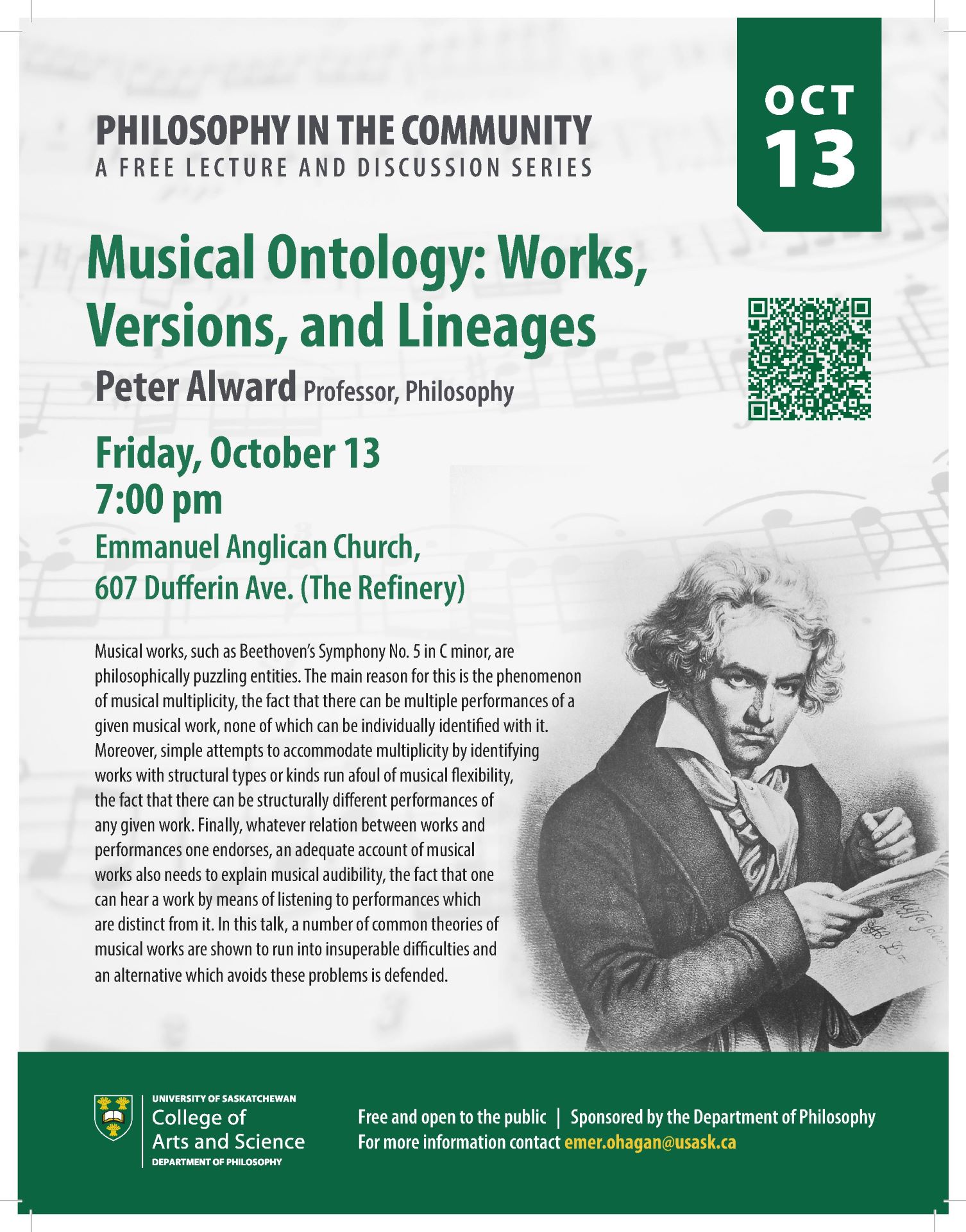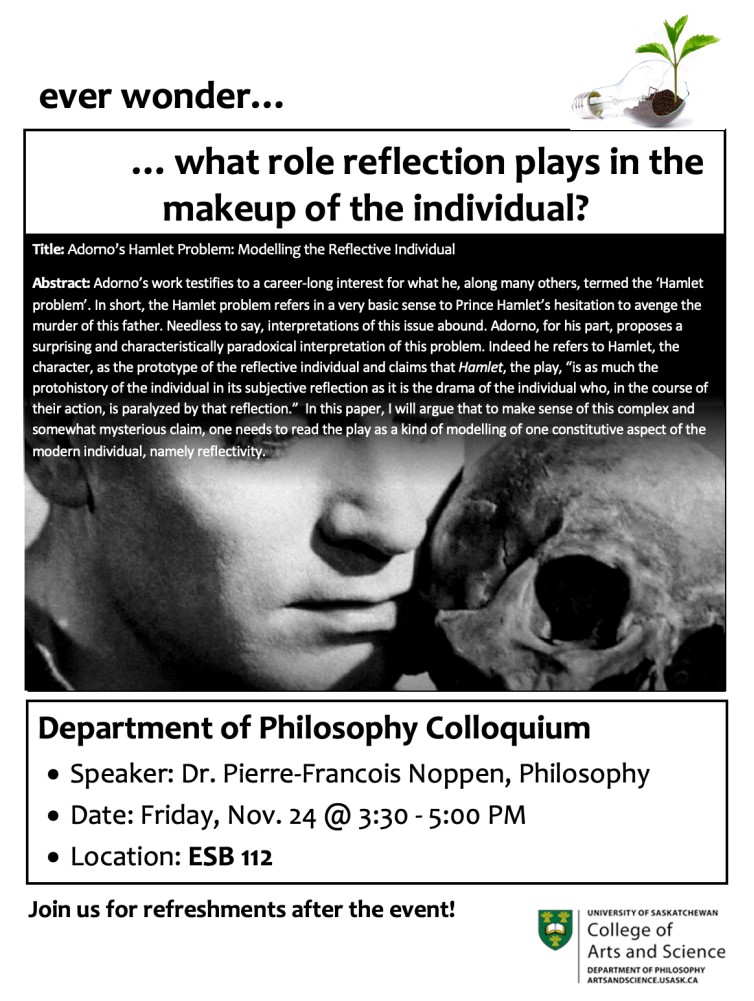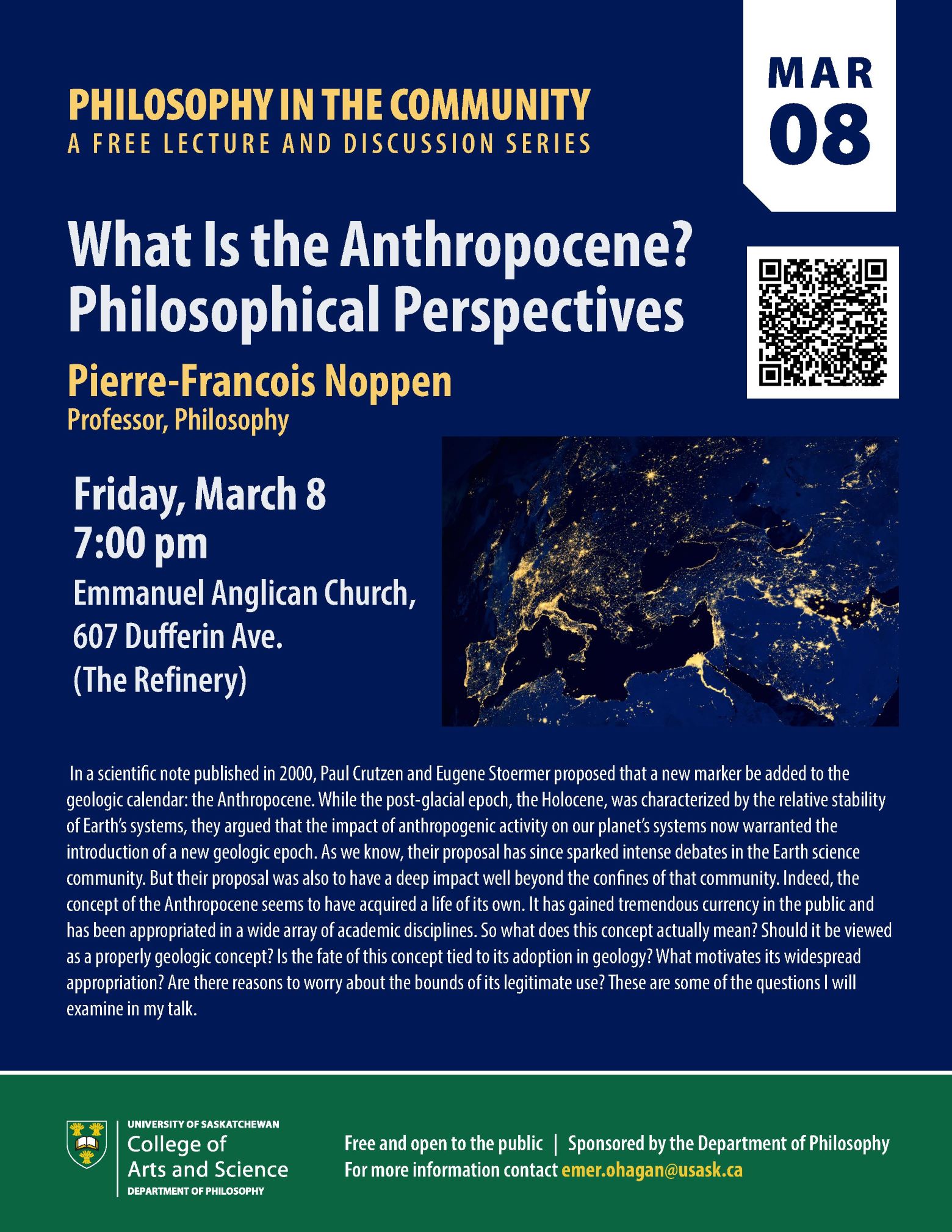Information
Philosophy in the Community is a lecture and discussion series organized by the Philosophy Department at the University of Saskatchewan. It is in place as a public service, so that we may share the rewards and pleasures of philosophical reflection with the members of our community. Philosophical thinking, reading and analysis is part of the life well-lived.
This series is free, no registration is needed. No philosophical background is required; intellectual curiosity is. Coffee provided.
*This event is in the basement of Emmanuel Anglican Church. The standard way to enter is on the southwest side of the building via a flight of stairs. People with mobility issues are welcome to send a note to emer.ohagan@usask.ca to arrange for other access. Please do this well in advance of the event. An external ramp on the north side of the building provides entry to the church, and from there an elevator can be used to get to the basement
For more information, contact: emer.ohagan@usask.ca
| Location | The Refinery Emmanuel Anglican (formerly St. James) Church Basement 607 Dufferin Avenue (at 12th Street, just off Broadway) |
| Time | 7:00 – 9:00 PM |
| Dates | Second Friday of each month, September through March: |
2023-24 Fall and Winter Series
|
September 8, 2023 What Do We Owe Each Other? |
In a duly famous article, "Famine, Affluence, and Morality,"Utilitarian philosopher Peter Singer defends the following principle:"if it is in our power to prevent something very bad from happening, without thereby sacrificing anything of comparable moral significance, we ought to do it." While seemingly uncontroversial, the principle has far-reaching consequences. Many of us can forgo luxuries without losing anything of moral significance, thus we should be giving those resources to those who live in poverty. In this presentation, O'Hagan will outline Singer's argument and then invite the audience to participate in small group discussions., followed by the usual Q&A. The discussion will help us develop our own thinking on the broader question, 'what do we owe each other?' "For those interested, Singer’s paper can be found here:
|
|
Musical Ontology: Works, Versions, and Lineages
|
Musical works, such as Beethoven’s Symphony No. 5 in C minor, are philosophically puzzling entities. The main reason for this is the phenomenon of musical multiplicity, the fact that there can be multiple performances of a given musical work, none of which can be individually identified with it. Moreover, simple attempts to accommodate multiplicity by identifying works with structural types or kinds run afoul of musical flexibility, the fact that there can be structurally different performances of any given work. Finally, whatever relation between works and performances one endorses, an adequate account of musical works also needs to explain musical audibility, the fact that one can hear a work by means of listening to performances which are distinct from it. In this talk, a number of common theories of musical works are shown to run into insuperable difficulties and an alternative which avoids these problems is defended. |
|
November 10th, 2023 Understanding and Resisting Epistemic Injustice |
Epistemic injustices are wrongs incurred on individuals in their capacity as knowers in society. This talk will draw upon Miranda Fricker’s Epistemic Injustice: Power and the Ethics of Knowing to briefly explain the two sorts of injustices outlined in this book: testimonial injustice, where an individual's testimony is not adequately valued due to their social position, and hermeneutical injustice, where a gap in society's shared conceptual resources prevents one from being understood. The second part of the talk aims to demonstrate that certain cases of religious offense give rise to situations that should be classified as instances of epistemic injustice. |
|
November 24th, 2023 Adorno’s Hamlet Problem: Modelling the Reflective Individual |
Adorno’s work testifies to a career-long interest for what he, along many others, termed the ‘Hamlet problem’. In short, the Hamlet problem refers in a very basic sense to Prince Hamlet’s hesitation to avenge the murder of this father. Needless to say, interpretations of this issue abound. Adorno, for his part, proposes a surprising and characteristically paradoxical interpretation of this problem. Indeed, he refers to Hamlet, the character, as the prototype of the reflective individual and claims that Hamlet, the play, “is as much the protohistory of the individual in its subjective reflection as it is the drama of the individual who, in the course of their action, is paralyzed by that reflection.” In this paper, I will argue that to make sense of this complex and somewhat mysterious claim, one needs to read the play as a kind of modelling of one constitutive feature of the modern individual, namely reflectivity.
|
|
December 8, 2023 What exactly is the ethics of care? |
Care ethics is widely understood as concerned with determining which care practices and values will best allow us to maintain and reproduce ourselves and our worlds. This talk challenges this conceptualization of care ethics, and instead contends that the ethics of care is better conceived of as a commitment to an iterative process of decentring the self to know the other. I discuss epistemic resources that help us with this decentring – our bodies, imagination, and humility – and show that it is through this difficult work that we come to revise and enrich our understandings of care (as both value and practice) in an ongoing way. |
|
January 12, 2023 Why Should We Trust Scientists? |
Science and scientists have been subjected to increasing public distrust in recent years, worryingly so for many of us during the recent COVID-19 pandemic. Reflecting on whether, when and why we should trust scientists thus seems more important than ever. Drawing on the work of philosopher of science Helen Longino, in this talk I explore why even though scientists individually are just as worthy of distrust as non-scientists, we can locate the real objectivity of science in its social nature and structure. This shows us why trusting science makes sense and why it is a mistake to view scientific disagreement as a ground for distrust. |
|
February 9, 2023 Free Will and Mad Scientists |
Do humans have free will, or are humans determined to act as they do? Compatibilists say both; humans are determined to act as they do, but they are still free because they want to act as they do, and are guided by reasons they endorse. The manipulation argument against compatibilism introduces a mad scientist who tweaks our brains such that we not only act as the scientist wishes, but he also makes us want to act this way, and be guided by reasons we endorse. 'Surely we cannot still be free in this case?', or so says the manipulation argument. In this talk I consider, and ultimately reject, various compatibilist responses to the manipulation argument.
|
|
March 8, 2023 What Is the Anthropocene? Philosophical Perspectives |
In a scientific note published in 2000, Paul Crutzen and Eugene Stoermer proposed that a new marker be added to the geologic calendar: the Anthropocene. While the post- glacial epoch, the Holocene, was characterized by the relative stability of Earth's systems, they argued that the impact of anthropogenic activity on our planet's systems now warranted the introduction of a new geologic epoch. As we know, their proposal has since sparked intense debates in the Earth science community. But their proposal was also to have a deep impact well beyond the confines of that community. Indeed, the concept of the Anthropocene seems to have acquired a life of its own. It has gained tremendous currency in the public and has been appropriated in a wide array of academic disciplines. So what does this concept actually mean? Should it be viewed as a properly geologic concept? Is the fate of this concept tied to its adoption in geology? What motivates its widespread appropriation? Are there reasons to worry about the bounds of its legitimate use? These are some of the questions I will examine in my talk.
|




